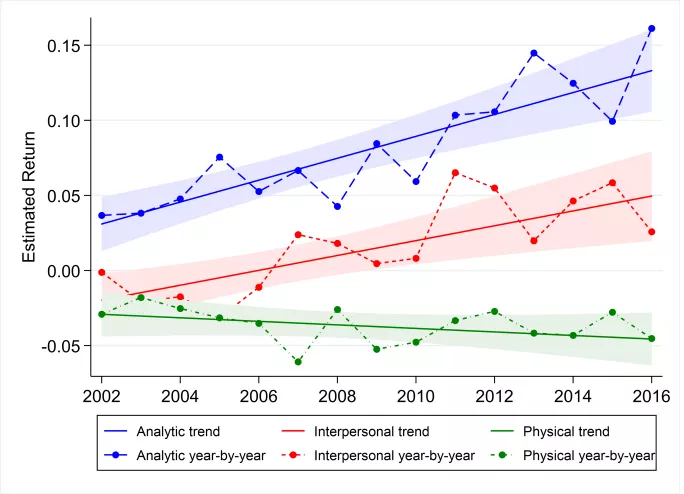Exclusive: Manual skills are in decline, research finds
Share
Exclusive: Manual skills are in decline, research finds
Today’s job market requires interpersonal skills, rather than the manual ones more traditionally at the heart of most vocational courses, a major piece of research exclusively shared with Tes shows.
The report by Andy Dickerson and Damon Morris, at the Centre for Vocational Education Research (CVER) at the London School of Economics, published today, says that between 2002 and 2016, the use of manual skills in the workplace declined across all areas of employment, while the use of analytical and interpersonal skills has increased significantly.
The two authors applied the measures of tasks and skills derived from the US O*NET (Occupational Information Network), which uses more than 200 descriptors of skills, abilities, work activities, training, work context and job characteristics for each of around 1,000 different occupations found in the UK.
Insight: ‘Now is the time to give adults the right to free basic digital skills training’
Opinion: ‘Robots are not the only labour market worry’
More on this: Government urged to give adults lacking functional skills access to training
Analytical skills
“Thus”, Mr Dickerson and Mr Morris say in the report, “we develop a database of comprehensive and detailed multi-dimensional occupational skills profiles for the UK which describe the utilisation of skills used in the workplace. These occupational skills profiles have many potential uses. For example, they can enable a much richer and deeper understanding of the changing patterns of the demand for skills to be developed.”
This proxy enabled the research team to construct three indices of skills: analytical/cognitive skills, interpersonal skills, and physical/manual skills. This was then combined with data on earnings from the Annual Surveys of Hours and Earnings and the Labour Force Survey to “provide a comprehensive picture of the changing demand for skills in the UK”.
The results “indicate strongly” the increasing use of both analytical skills and interpersonal skills, and declining use of physical skills across the period between 2002 and 2016 (see graph). Further analysis shows that the majority of the change in skills utilisation is “within occupations, rather than between occupations” - so the changes are widespread across all sectors, rather than being down to changes in the jobs market.
‘Changing occupational structure’
In a blog also published today, the authors say: “Over the whole period, the index of analytical skills suggests that utilisation of this skill set grew by 10 per cent over the period. The increase in interpersonal skills was more than double this (+23%), while utilisation of physical skills fell by 14 per cent. These trends accord with our general understanding of the changing occupational structure of employment and the growth of services and the decline of manufacturing.”
“The findings demonstrate the increasing importance of work-related skills for individuals’ earnings, over and above their educational qualifications and, in particular, for higher levels of analytical skills and interpersonal skills in the workplace. Our interpretation of the increased utilisation coupled with increasing returns to analytic and interpersonal skills is that the UK is experiencing significantly increased demand for these skills in the labour market.
“The policy implication is that analytical and interpersonal skills need to be developed within every type of education - whether so-called ‘vocational’ or ‘academic’. This is what the modern labour market requires.”
‘The value of qualifications’
Mr Dickerson said: “People are not their qualifications. So much of what we understand and mean about education is focused around qualifications. It is very instrumentalist and is always about the value of the qualifications.
“Certifications may have been gained a long time ago. Take a computer scientist [who trained] in the 1970s: to what extent is what they learned in those days relevant today? Looking at how these skills are valued in the labour market, the knowledge they have learned is less important than the skills they gain.”
Fiona Aldridge, director for policy and research at the Learning and Work Institute, said: “As interpersonal and cognitive skills are attracting returns both in terms of greater employment opportunities and higher levels of income, then we need to ensure that these are integrated into all pathways, be that academic and technical - both college-based and apprenticeships - and into study at all levels more widely.
“There are some significant changes to the labour market shown here over a 15-year period. Given that we are now starting to talk about the 50-year working life, we need to ensure that our education system does not too narrowly focus on the skills that are needed in the short term, without properly thinking about how we educate for a much longer working life.”





